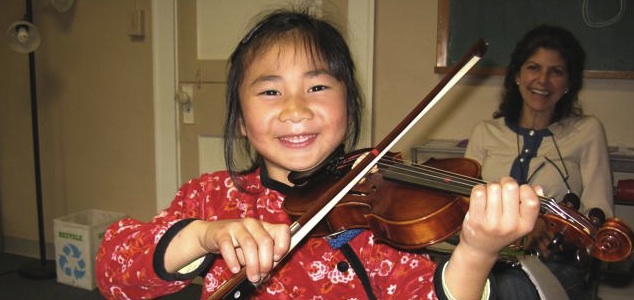
The first group class of the year proved to be very valuable for students, who got to play together for the first time since the long holiday, and especially for the parents, who all participated in a discussion/parent forum. Everyone, myself included, went away feeling energized and inspired for the year to come.
First, we all discussed the fundamental principles of the Suzuki Method, which are listed and briefly explained on the “Suzuki Philosophy” tab on this website. The following are the hallmarks of the method, which Dr. Suzuki fashioned after a child’s acquisition of her mother tongue.
- Every Child Can Learn
- Parental Involvement
- Early Start
- Listening to an Aural Model
- Positive, Nurturing Environment
- Learning to Speak (Play the Instrument) before Learning to Read
- Repetition
- Reviewing and Maintaining a Repertoire
- Group Learning
As parental involvement is a cornerstone of the Suzuki Method, I spoke about a few important roles and responsibilities that parents have. The following points are things that have been on my mind lately:
- The success of a child with an instrument is ultimately the parent’s responsibility. It is the parent’s involvement, dedication, and attitude that will directly influence the child’s success.
- Learning an instrument is a discipline, the same as maths, reading, or any other subject. No parent would ever allow their child to “opt-out” of maths in school. Music, just like any other discipline, requires commitment and dedication.
- Violin (or viola) can be a regular part of family life. Dr Suzuki once wisely said, “Only practise on the days that you eat.” Children learn to do daily tasks that they may not particularly enjoy – brushing their teeth, washing their hands, etc. Practising the violin can become a habit that is a regular part of daily life.
- Taking notes at each lesson is an essential role of each parent as the at-home tutor. Taking notes helps parents remember important details of the lesson, which enables them to be more effective at helping their children practise at home.
- Every parent and child experience rough patches on their musical journey. We must remember that, just like the weather, we have good and bad violin days. During a rainy stint (like we had this past December & January), it would be ridiculous to think that we will never see the sun again. We can get through these times by using our creativity, getting ideas from the teacher and other Suzuki parents, and remembering our commitment to the violin.
- You will get out of it what you put into it. This is the bottom line for the violin journey.
Each parent who attended the forum had an opportunity to share some personal tips and strategies that have worked for them as a Suzuki parent. Here are some highlights:
- Attend workshops as often as possible. Several parents voiced that Suzuki workshops have been one of the most important parts of their violin journeys as they are inspiring, motivating, rewarding, and idea-stimulating.
- Keep up lessons and practise during the holidays. Keeping up lessons and a practise routine promotes progress rather than decline with the violin. Not doing so can often make things worse when your child starts up again. Sometimes children feel like they have digressed and their confidence can wane after a long period without playing. Skype lessons may be another option for keeping up the routine when away on holiday.
- Practise at the same time every day, preferably in the mornings when children are fresh. Children thrive on routine. Making practise an integral part of the child’s daily routine will make it easier for everyone.
- Watch YouTube videos of Suzuki kids and professional violinists. Children raise awareness by analyzing why they think a performance is good or bad, and they then start becoming more aware of their own habits and playing. Great performances are also very motivating and inspiring.
- Play games during practise to make it fun! Be creative. Engage the child’s imagination – make up a story, create an imaginary scenario, use fantasy! The sky is the limit with this category. Let loose and have fun!
- Set rules, such as no TV until after violin practise. Find out what the child’s currency is and use it as a motivator to practise.
- Try using the “other half” to step in and help out when a sticky situation arises. Diverting the child’s attention to her other parent can sometimes do the trick in dissipating a negative attitude or environment.
- Make video and/or audio recordings. This is a tremendous learning and motivational tool for ALL musicians. In the recording process, musicians are self-motivated to raise their awareness of their own playing, and to give their best possible effort.
- Encourage children who are old enough to take stock in their own playing. Doing exercises such as having your child write down what they like about playing the violin can often encourage them to commit to and take more ownership of their violin playing.
I’m sure we could all write a lengthy book of tips and strategies based on our collective experience. I hope that the highlights from the beginning of the year parent forum will give you new ideas to invigorate you and your child for the new year. Thanks to everyone who contributed!

Discussion